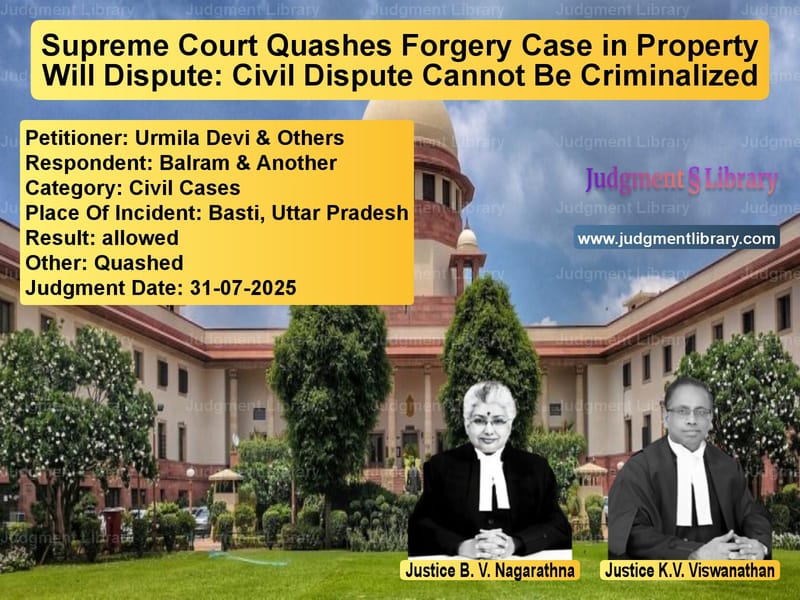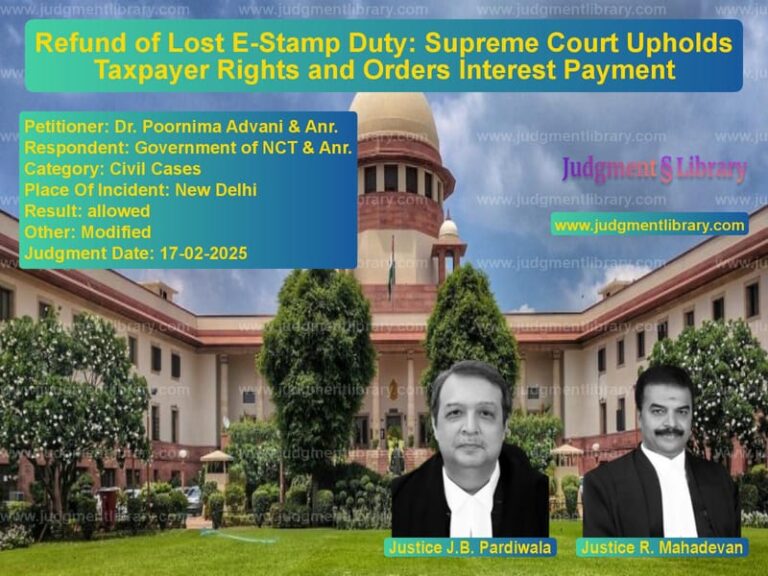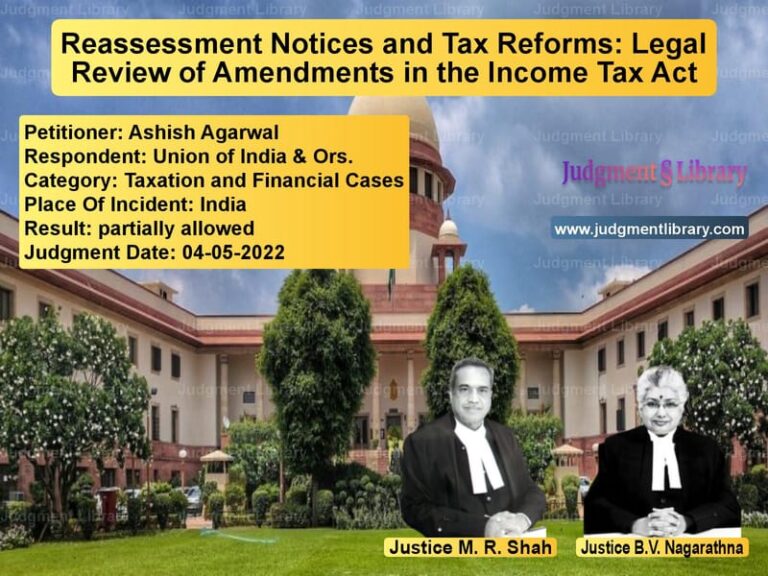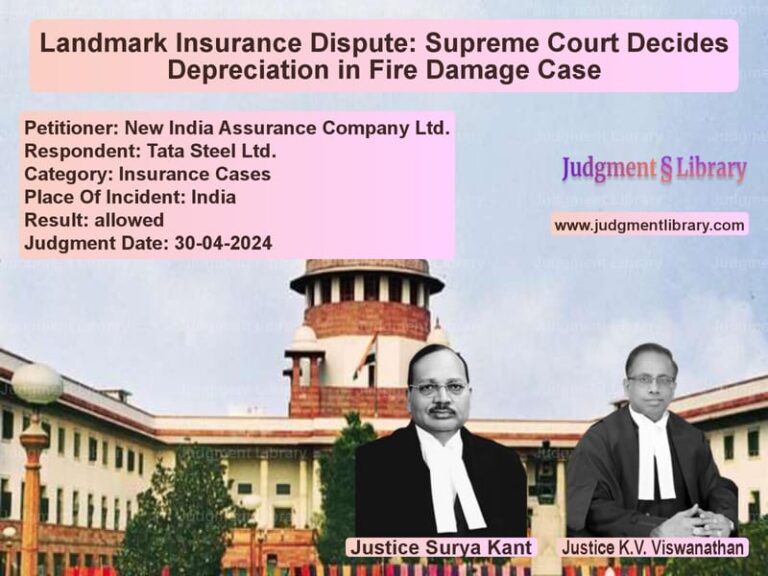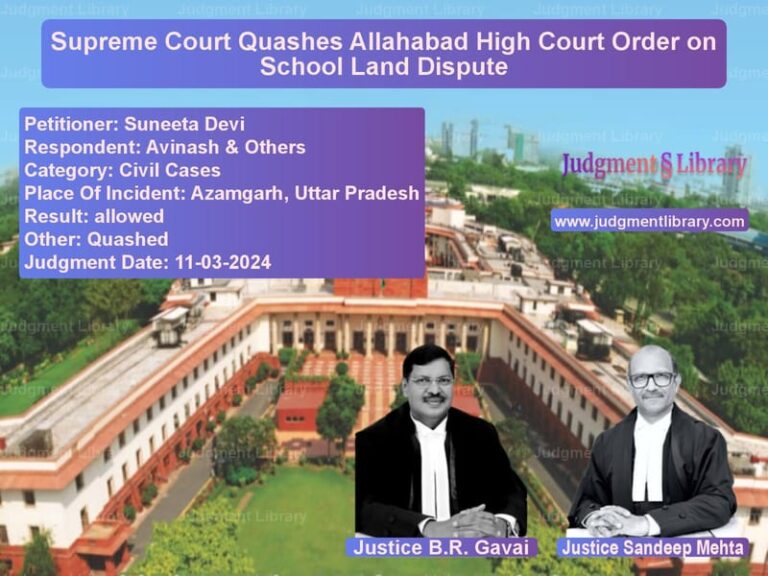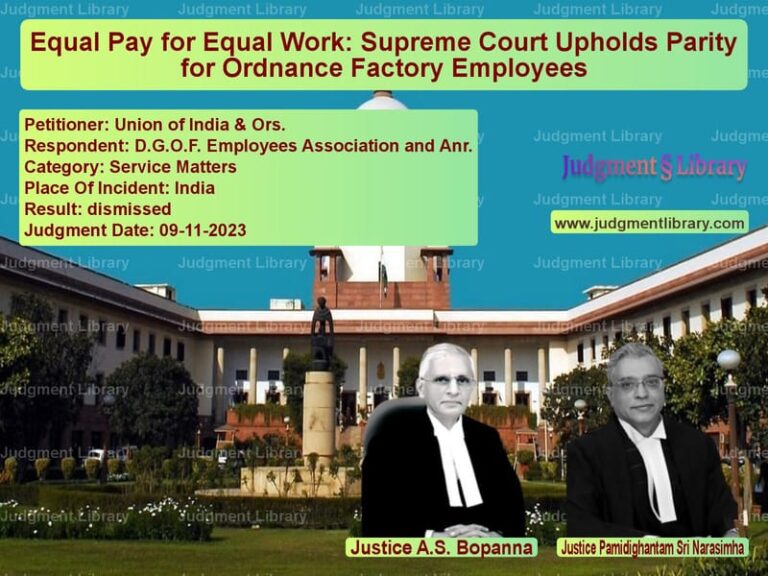Supreme Court Quashes Forgery Case in Property Will Dispute: Civil Dispute Cannot Be Criminalized
In a landmark judgment that highlights the fine line between civil disputes and criminal offenses, the Supreme Court of India has quashed criminal proceedings that had been pending for over two decades in a family property dispute. The case of Urmila Devi & Others versus Balram & Another serves as a crucial precedent against the misuse of criminal law to settle essentially civil matters.
The story begins with an elderly man, Shri Ram Baksh Dubey, who was deeply concerned about preserving his family estate. He had four sons but was particularly worried about his third son, Ashish Kumar, whom he feared would waste the family property due to what the judgment describes as ‘alcoholic obsessions and vices.’ To protect his estate from being ‘jeopardized and trammeled,’ the testator executed an unregistered will on December 23, 1993, bequeathing all his properties to his four daughters-in-law rather than to his sons directly.
The will specifically recorded the testator’s intent to ensure that his ‘land and property are not jeopardized, and his daughters-in-law and grandchildren are not deprived of it.’ The document noted that the daughters-in-law had ‘helped him and cared for him’ during his lifetime. This decision, while unusual, reflected the testator’s genuine concern for preserving his legacy.
After the testator passed away on January 3, 1994, events took a complicated turn. His third son, Ashish Kumar, executed a registered sale deed on April 25, 1994, selling his share in the testator’s property to the complainant-respondent, Balram. Meanwhile, the daughters-in-law (the appellants), unaware of this sale deed, filed for mutation of the property based on the will dated December 23, 1993. The Tehsildar, Harraiya, passed a favorable mutation order on September 27, 1994.
As the complainant-respondent continuously interfered with the peaceful possession of the accused-appellants, they filed a civil suit (O.S. No.588 of 1997) seeking a permanent injunction against him. The trial court passed an ex-parte ad-interim order restraining the respondent from carrying out any construction on the disputed property or cutting crops on the land.
Aggrieved by this interim order, the respondent filed objections against the mutation order along with an application seeking its recall based on the sale deed. However, these objections were rejected for non-prosecution on January 9, 1998. It was only years later, on January 12, 2001, that the complainant-respondent filed an application under Section 156(3) Cr.P.C. alleging that one of the testator’s sons, Chandra Prakash, had conspired with the appellants and forged a fraudulent unregistered will after the testator’s death to circumvent the sale deed.
The Investigation Officer submitted a report stating that the complainant had no papers for the said land and that civil proceedings regarding the disputed land were already pending before the Tehsildar. Despite this, the Additional Chief Judicial Magistrate-II, Basti directed the registration of a complaint case, which was numbered as Complaint Case No.627 of 2002. The court found a prima facie case against the accused-appellants and issued summons for offenses under Sections 419, 420, 467, 468, and 471 of the Indian Penal Code.
The appellants approached the Allahabad High Court seeking quashing of the criminal complaint under Section 482 of the Cr.P.C., but their application was dismissed after sixteen years of pendency on April 9, 2019. The High Court took the view that the allegations clearly satisfied the ingredients of the alleged offenses and that the question of whether the document was forged or not was a matter to be examined during trial.
The appellants then approached the Supreme Court, where their learned counsel, Sri Tripurari Ray, made several crucial arguments. He contended that ‘this is not a case where any of the ingredients for the alleged offences under Sections 419, 420, 467, 468, and 471 of the IPC are even prima facie present.’ He argued that ‘the circumstances make it apparent that the criminal proceedings were initiated only to abuse the process of law with the oblique aim of settling the civil disputes between the parties.’
Furthermore, he pointed out that the High Court failed to appreciate that the mutation order in favor of the appellants was passed after granting full opportunity to the complainant-respondent and that once the objections filed by the complainant were dismissed, no further proceedings were initiated. Similarly, no further proceedings were ever initiated challenging the rejection of the counter-claim in the civil suit, meaning those orders had attained finality.
The appellants relied on several Supreme Court precedents, including Prof. R.K. Vijayasarathy v. Sudha Seetharam and Anand Kumar Mohatta & Anr. V. State (NCT of Delhi), to contend that the High Court should have exercised its inherent powers under Section 482 of the Cr.P.C. to quash proceedings that are essentially of a civil nature but have been given the disguise of a criminal offense.
On the other hand, the respondent’s counsel, Sri D.P. Singh Yadav, argued that the High Court was correct in observing that the allegations in the complaint clearly satisfied the ingredients of the offenses and that the question of ascertaining the veracity of forgery was subject to determination by trial. He contended that the High Court had rightly construed the dispute to be of a criminal nature and refused to quash the complaint case.
The Supreme Court, after hearing both parties at length and perusing the material on record, placed significant reliance on the seminal judgment in State of Haryana v. Bhajan Lal (1992), particularly paragraph 102 and sub-paras 1, 3, 5, and 7. The Court quoted these provisions verbatim: ‘102. (1) Where the allegations made in the first information report or the complaint, even if they are taken at their face value and accepted in their entirety do not prima facie constitute any offence or make out a case against the accused. *** (3) Where the uncontroverted allegations made in the FIR or complaint and the evidence collected in support of the same do not disclose the commission of any offence and make out a case against the accused. *** (5) Where the allegations made in the FIR or complaint are so absurd and inherently improbable on the basis of which no prudent person can ever reach a just conclusion that there is sufficient ground for proceeding against the accused. *** (7) Where a criminal proceeding is manifestly attended with mala fide and/or where the proceeding is maliciously instituted with an ulterior motive for wreaking vengeance on the accused and with a view to spite him due to private and personal grudge.’
The Court examined the specific offenses alleged against the appellants – Sections 419 (Punishment for cheating by personation), 420 (Cheating and dishonestly inducing delivery of property), 467 (Forgery of valuable security, will, etc.), 468 (Forgery for purpose of cheating), and 471 (Using as genuine a forged document) of the IPC. After thorough consideration, the Court stated: ‘We fail to understand as to how the allegations against the appellants herein who are only legatees under the Will in question, could be sustained in light of the material on record.’
The Court observed that ‘the allegations against the accused-appellants, in sum and substance, are that they entered into a conspiracy with other individuals to fabricate a forged will after the death of the testator that was then used to circumvent the sale deed dated 25.04.1994.’ However, upon appreciating the facts and circumstances, the Court found that ‘We do not find that the offences aforementioned are made out in the present case. Neither do we find any criminal breach of trust nor do we find any cheating by impersonation. We also do not find any cheating and dishonestly inducing delivery of property. In these circumstances, we fail to see how it could be alleged that the accused-appellants cheated and dishonestly induced the complainant-respondent No.1.’
The Court noted that ‘It is writ large on the face of the record that the complaint case has been employed as a circuitous tool to abuse the process of law, especially after the complainant-respondent No.1 failed to pursue the remedies available to it.’ The chronology of events indicated that the criminal proceedings were instituted only after approximately seven years of the mutation order, four years after the ex-parte ad-interim order, and three years after the rejection of the objections to the mutation order.
The Court drew support from its earlier decision in Inder Mohan Goswami vs. State of Uttaranchal, which dealt with Sections 420 and 467 IPC. The Court quoted paragraphs 42-44 and 46 of that judgment, including the crucial observation that: ‘The court must ensure that criminal prosecution is not used as an instrument of harassment or for seeking private vendetta or with an ulterior motive to pressurise the accused.’
Referring to Madhavrao Juvajirao Scindia vs. Sambhajirao Chandrojirao Angre, the Court noted that ‘the criminal process cannot be utilized for any oblique purpose’ and that ‘the court should quash those criminal cases where the chances of an ultimate conviction are bleak and no useful purpose is likely to be served by continuation of a criminal prosecution.’
The Court also cited R.K. Vijayasarathy, where it was held that while exercising powers under Section 482 of the Cr.P.C, a High Court can examine whether a matter which is essentially of a civil nature has been given a cloak of a criminal offense. More recently, in Vishal Noble Singh v. State of Uttar Pradesh, the Court held that ‘courts have to be vigilant to ensure that the machinery of criminal justice is not misused for achieving oblique motives and agendas. Tacitly endorsing such misuse only unnecessarily burdens the courts and the criminal justice system.’
The Court particularly emphasized the fundamental principle for exercise of powers under Section 482 of the Cr.P.C. as described in State of Karnataka v. L. Muniswamy: ‘In the exercise of this wholesome power, the High Court is entitled to quash a proceeding if it comes to the conclusion that allowing the proceeding to continue would be an abuse of the process of the Court or that the ends of justice require that the proceeding ought to be quashed. The saving of the High Court’s inherent powers, both in civil and criminal matters, is designed to achieve a salutary public purpose which is that a court proceeding ought not to be permitted to degenerate into a weapon of harassment or persecution. In a criminal case, the veiled object behind a lame prosecution, the very nature of the material on which the structure of the prosecution rests and the like would justify the High Court in quashing the proceeding in the interest of justice.’
After careful consideration of these judicial precedents, the Supreme Court concluded that ‘none of the offences alleged against the accused-appellants herein are made out. The instant case is just another one in a string of cases filed in recent years that seek to disguise a civil dispute as criminal. The complaint case against the accused-appellants has been pending for over two decades and its continuation would not serve any purpose.’
The Court found that the principles laid down in Bhajan Lal, particularly sub-paragraphs 1, 3, 5 and 7 of paragraph 102, ‘squarely apply to the facts of this case. In our view, it is in the interest of justice that present proceedings be quashed.’
Accordingly, the Supreme Court set aside the impugned order of the High Court and quashed the proceedings in Complaint Case No.627 of 2002 pending before the Chief Judicial Magistrate, Basti. The Court clarified that any observations made in this judgment would not have a bearing on any civil proceedings that might be pending between the parties.
This judgment serves as a significant reinforcement of the principle that criminal law should not be used as a tool for settling civil disputes. It protects citizens from the harassment of prolonged criminal proceedings when the essential nature of the dispute is civil, and ensures that the criminal justice system is not burdened with cases that essentially involve civil rights and obligations. The Court’s strong stance against the misuse of criminal proceedings sends a clear message about the importance of maintaining the distinction between civil wrongs and criminal offenses.
Petitioner Name: Urmila Devi & Others.Respondent Name: Balram & Another.Judgment By: Justice B. V. Nagarathna, Justice K.V. Viswanathan.Place Of Incident: Basti, Uttar Pradesh.Judgment Date: 31-07-2025.Result: allowed.
Don’t miss out on the full details! Download the complete judgment in PDF format below and gain valuable insights instantly!
Download Judgment: urmila-devi-&-others-vs-balram-&-another-supreme-court-of-india-judgment-dated-31-07-2025.pdf
Directly Download Judgment: Directly download this Judgment
See all petitions in Property Disputes
See all petitions in Succession and Wills
See all petitions in Fraud and Forgery
See all petitions in Contract Disputes
See all petitions in Cheque Dishonour Cases
See all petitions in Judgment by B.V. Nagarathna
See all petitions in Judgment by K.V. Viswanathan
See all petitions in allowed
See all petitions in Quashed
See all petitions in supreme court of India judgments July 2025
See all petitions in 2025 judgments
See all posts in Civil Cases Category
See all allowed petitions in Civil Cases Category
See all Dismissed petitions in Civil Cases Category
See all partially allowed petitions in Civil Cases Category

